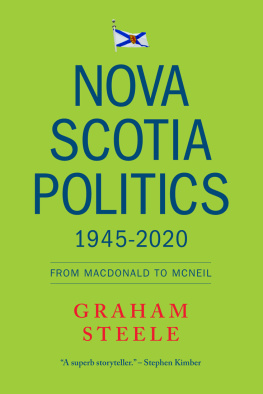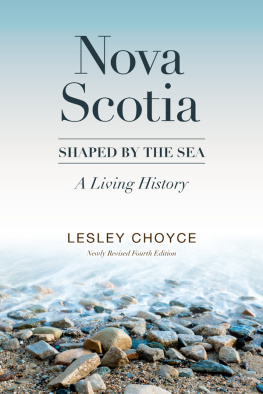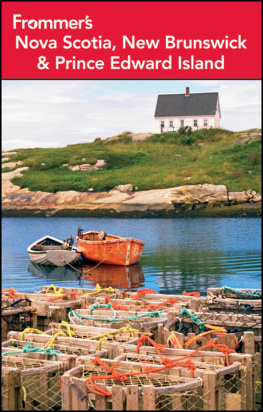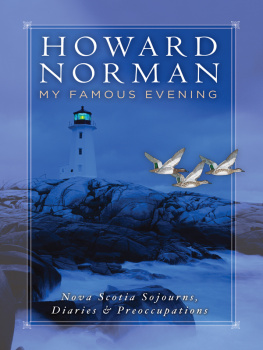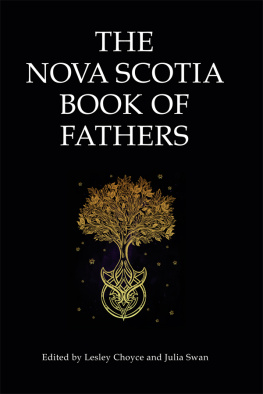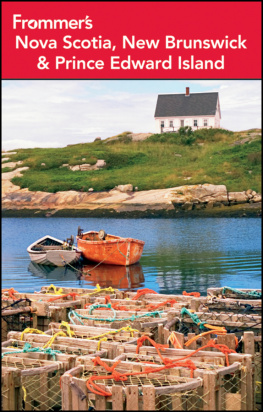2017 Brenda Thompson
All rights reserved. No part of this book may be reproduced or transmitted in any form or by an means, electronic or mechanical, including photcopying, or by an information storage or retrieval system without permission in writing from the publisher.
SSP Publications recognizes the support of the Province of Nova Scotia. We are pleased to work in partnership with the Department of Communities, Culture and Heritage to develop and promote our cultural resources for all Nova Scotians.
Front cover image: Lance Woolaver
Back cover image: Steven Rhude painting, photo by Ernest Cadegan
Design: Gwen North
Library and Archives Canada Cataloguing in Publication
Thompson, Brenda, 1963-, author
A wholesome horror: poor houses in Nova Scotia / Brenda Thompson.
Includes bibliographical references and index.
ISBN 978-0-9868733-5-5 (softcover)
ISBN EPUB: 978-0-9868733-5-5
1. Almshouses--Nova Scotia--History. 2. Public welfare--Nova Scotia-- History. 3. Poor laws--Nova Scotia--History. I. Title.
HV63.C3T46 2018 | 362.58309716 | C2018-901359-1 |
Box 2472, Halifax, N.S. B3J 3E4 Canada
sspub.ca
Printed in Canada
For My Parents,
Juanita and Richard Thompson
Acknowledgements
Without the love and support of my family, I would never have been able to reach my writing goals. Thank you to my daughters, Megan and Gwynneth Thompson, who put up with me constantly shushing and ignoring them so that I could write; to my parents, Rick and Juanita Thompson, who read over every word and encouraged me to write more; and to my husband, Kent Folks, who tolerated my papers and books everywhere and listened to single topic conversations for months.
To Scott Smith, thank you for encouraging me to write and for publishing this book. We had great conversations! Lets do it again!
Thank you to Wayne E. Baltzer for enthusiastically sharing his private collection of photos and research about poor houses in Kings County.
To Lance Woolaver, who had encouraged me to write and regularly checks in to see how my writing is going.
A special shout-out to the Halifax-based writing group called Senior Scribes and Dr. Allan Marble, who wrote about the most unpopular of subjects poor people. They examined the lives of poor people with open minds when most writers dismissed people living in poverty as victims of their own bad decisions.
And finally, thanks to all of those who have lived in poverty or are now living in poverty and still fight to survive and make life better for themselves, their families and other poor people despite being up against powerful adversaries who wish to keep them where they are.
Foreword
One of the great pleasures in a writing life is the meeting up with other writers. I greatly enjoyed meeting Brenda Thompson in the summer of 2017, together with her partner Kent Folks, at our home in Halifax, not remembering that we had met in Annapolis Royal years ago at the first production of Maud Lewis: World Without Shadows at Kings Theatre in Annapolis Royal. Fortunately, Brendas memory is much better than mine. She works harder too.
I was intrigued by the prospect of Brendas new book. The poor houses and poor farms of Nova Scotia were subjects in which I have long been interested. This interest grew out of my books and plays and film about Maud Lewis, the Nova Scotia folk artist. I knew that Maud had avoided incarceration in a poor house in Yarmouth County, Nova Scotia following the birth of her out-of-wedlock child in 1928. And I knew that Maud had become friends with the kindly and charitable Olive Hayden, Matron of the Almshouse (see definition p. 56) of the Poor Farm in Marshalltown, Digby County, following Olives marriage to the Keeper, Halton Hayden, in 1939. Maud and her husband, the poor farm night watchman Everett Lewis, were welcome to take their meals at the Almshouse. And I had written a play set in the old Marshalltown Almshouse entitled The Poor Farm based on local interviews and village stories. Brenda Thompson, however, has taken this work far beyond my gatherings and presented us with the first comprehensive and complete Nova Scotian account of these houses of poverty: A Wholesome Horror. I am happy to have met Brenda again and happy to meet up with her work.
As it turns out, Brenda and I nearly met again in 1995. I was in Digby County in the 1990s and spending a lot of time in and about the still-standing Almshouse and shooting a documentary film. I found myself in Marshalltown the day before the Almshouse burnt down in its fields by the highway; I took the last portrait of this prison for the poor my partner Bob Brooks, the famous photographer, was on his way from Halifax. Bob arrived after the structure was completely incinerated and took some photos of the smoking ruins. Brenda was among those who gathered during the fire. I missed the fire. The conflagration was adjudged arson, and with the murder of the husband of Maud Lewis, Everett Lewis, the former child inmate of the Poor Farm, it was the second great crime on that stretch of that country road. Brenda was there for that historic and somehow symbolic moment, just as she presents us now with her original and thorough and very readable history of a story many have preferred to ignore.
There is much in A Wholesome Horror that will be new and unknown to Nova Scotians. I did not know that the incarceration of First Nations citizens of Canada in the poor farms was so extensive. I did not know much about the casual and callous use of the unclaimed bodies of poor farm and poor house inmates. I simply did not know the extent of these prisons throughout our idyllic and kind province. We built them and filled them in every county, sometimes two. We incarcerated the unmarried, the elderly, our veterans from foreign wars, unwanted family, the ill, and in bizarre fashion stubborn children, beggars and fortune tellers, to quote from Brendas book. And many of these inmates died in these prisons from fire, from epidemic, from age and neglect. In brief, we were cruel. Our past tells us that every time we built a charitable institution in Nova Scotia, we created greater crimes. The few good and kind Keepers and Matrons of the Poor Farms tell us only that a better kind of place was always possible. We were rarely up to the job. The closing of the poor farms and poor houses in the 1960s must have been accompanied by a province-wide whistling past the graveyards.
And now that this story has been told, it is time to support the groups of local people in their own Nova Scotian communities who now attempt to locate and protect the graves where these unrecognized dead lie buried. This too is recounted in Brendas history. The last indignity of the poor farms and the poor houses was the unmarked burial of the unwanted poor. Local groups of Nova Scotians in their own villages and towns now attempt to right this wrong. It seems so little, the remembrance of these for long years wastelands, but in many cases it has been a struggle. Hopefully, and with the help of Brenda Thompsons work, this struggle can be won. Good job, Brenda.
Lance Woolaver
Nova Scotia



